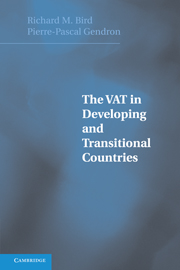Book contents
- Frontmatter
- Contents
- List of Tables
- Preface
- 1 Why This Book?
- 2 The Rise of VAT
- 3 Is VAT Always the Answer?
- 4 Trade and Revenue
- 5 Equity and the Informal Sector
- 6 What Should Be Taxed?
- 7 Key Issues in VAT Design
- 8 New Issues in VAT Design
- 9 Administering VAT
- 10 Dealing with Difficulties
- 11 The Political Economy of VAT
- 12 Where Do We Go from Here?
- Annex
- References
- Index
10 - Dealing with Difficulties
Published online by Cambridge University Press: 16 November 2009
- Frontmatter
- Contents
- List of Tables
- Preface
- 1 Why This Book?
- 2 The Rise of VAT
- 3 Is VAT Always the Answer?
- 4 Trade and Revenue
- 5 Equity and the Informal Sector
- 6 What Should Be Taxed?
- 7 Key Issues in VAT Design
- 8 New Issues in VAT Design
- 9 Administering VAT
- 10 Dealing with Difficulties
- 11 The Political Economy of VAT
- 12 Where Do We Go from Here?
- Annex
- References
- Index
Summary
Even if attention has been paid to all the elements of good VAT administration we discussed in Chapter 9, tax administration remains a difficult task even at the best of times and in the best of places – conditions seldom met in developing or transitional countries. The way a tax system is administered affects its yield, its incidence, and its efficiency. It matters. Good tax administration is both inherently country-specific and surprisingly hard to quantify in terms of both outputs and inputs. The best tax administration is not simply that which collects the most revenues; facilitating tax compliance is not simply a matter of adequately penalizing noncompliance; tax administration depends as much as or more on private as on public actions (and reactions), and there are complex interactions among various environmental factors, the specifics of substantive and procedural tax law, and the outcome of a given administrative effort (Bird 2004a). All this makes the administration of a VAT complex. We discuss in this chapter two particular issues that have proved particularly difficult to deal with in many developing and transitional countries. One issue – the refund problem – relates to keeping those within the VAT system honest; the other – dealing with the small and shadowy – relates more to ensuring that those who should be within the VAT system actually are. As a filling between these two slices of VAT administrative problems, we also discuss some general ways in which VAT administration can be improved.
- Type
- Chapter
- Information
- The VAT in Developing and Transitional Countries , pp. 176 - 192Publisher: Cambridge University PressPrint publication year: 2007



